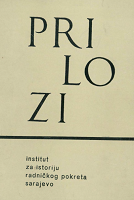PARTIZANSKI RAT I SELO U NAŠEM NOR-U
THE PARTIZAN WAR AND THE VILLAGE IN THE PEOPLE’S LIBERATION WAR
Author(s): Pero MoračaSubject(s): Political history, Politics and society, WW II and following years (1940 - 1949)
Published by: Institut za istoriju
Keywords: liberation war; Partizan war; Yugoslav;
Summary/Abstract: The invitation to the scholarly meeting on Semberija in the People’s Liberation War gave me an incentive to work a little more on the problem of the partizan war as a phenomenon of our time and on the role of peasantry in the People’s Liberation War as well as in the socialist revolution. The topic which is dealt with in this paper has been dealt with only superficially in Yugoslav historiographic literature. But history teaches us that the partizan war has from times immemorial been a natural form of resistance to the invader or native oppressor. Moreover, the experience of the Second World War, then of all regional and local wars after it, gave the phenomenon of the partizan war a new quality. The essence of this quality is not to be explained by whatever military reasons, for it is determined, above all, by social and political motives. In this paper I want to bring out my knowledge and reflections on this matter. This is illustrated also by the experience of all uprisings, rebellions, and movements in older as well as in more recent history, which unambiguously confirms the fact that the village and peasantry were their fundamental force and pivot. These uprisings, rebellions, and movements gained in intensity and scope depending on how much social aspirations and interests of the masses corresponded to those of the leading classes which took part in these events. They, on the other hand, lost intensity and fell to low tides and crises depending on the degree of differences in these aspirations and interests. Hence it is natural that in our era the partizan war, which no difficulties, including extreme technical inferiority, can destroy, frequently grows into an all people’s war when led by a number of socio-political forces. A series of partizan wars — from the Yugoslav to the latest one, on the Indochinese subcontinent — show that the key to their success lies, above all, in the firm bond between broad popular masses, primarily peasant masses, and the leading forces of the movement. In the comments to follow, I intend to illustrate this thesis with an example from Yugoslav actuality.
Journal: Prilozi
- Issue Year: 1971
- Issue No: 7
- Page Range: 103-114
- Page Count: 12
- Language: Bosnian

